Call for Ideas:Transregional Workshop
“Imagining Futures: Dealing with Disparity” (2023)
We invite current, incoming, and former fellows of the Merian Center for Advanced Studies in the Maghreb (MECAM), and scholars from MECAM’s partner institutions in the Maghreb and the Mashreq to explore their research questions and develop innovative ideas within the collaborative work format of a Transregional Workshop in the framework of MECAM’s guiding theme “Imagining Futures: Dealing with Disparity” and one or more of its interdisciplinary Research Fields (IRF).
( Deadline: October 2nd, 2023, 12.30 PM CEST )
MECAM’s Transregional Workshops are meant to encourage collaborative work among Fellows and Alumni of MECAM, and scholars from MECAM’s partner institutions on issues of common concern. We offer an open, flexible and non-hierarchical format, access to strong scholarly networks, and support in conceptual development and funding, while handling all practical organizational aspects, and providing secure virtual workspaces for collaboration before and after the events.
Transregional Workshops, the first is scheduled for 2024, can serve as an opportunity for the intensive debate and exploration of a particular theme or for identifying, testing, and developing new topics, methods, questions, and research projects, in a multi-disciplinary and international constellation. It is a small-scale (max. 15 participants), short-term and intensely focused event that tests the sustainability of research ideas and develops new forms of cooperation to advance the theme in question that should be related to one or more of MECAM’s IRF’s. Workshops are directed by two to five conveners. They can be arranged with or without a call for applications.
The Transregional Workshops will be held in Sfax or Casablanca. They aim to delve into ideas, generate research questions, and to contribute to the research agenda of MECAM’s guiding theme, “Imagining Futures: Dealing with Disparity,” and its five International Research Fields (IRFs) mentioned above. They can provide a fertile ground for scholars to explore the dynamic interplay between art, culture, social disparities, memory, resources, and diverse identities in the Maghreb, the Middle East and beyond.
We are looking forward to applications that approach questions relating to one or more of the IRF’s from diverse disciplinary, local, regional angles, that contribute to knowledge production from and in the Maghreb and in neighboring regions, rather than solely focusing on one region. We encourage critical engagement with the complexities of the ongoing transformation processes.
ELIGIBILITY
MECAM’s current, incoming and former fellows and scholars from MECAM’s partner institutions in the Maghreb and the Mashreq.
APPLICATION PROCEDURE
- Proposals in French or in English can be handed in by one or more (up to five) MECAMFellow(s), Alumni, or scholars from MECAM’s partner institutions in the Maghreb andthe Mashreq. Please submit a CV and a 1-2 page proposal for a TransregionalWorkshop, explaining the originality of your idea, and how it relates to one or moreof MECAM’s IRF’s and to its guiding theme “Imagining Futures – Dealing withDisparities”. We kindly ask you to submit your proposal with a suggestion of scholarsyou would like to invite, and a brief reference what their potential contribution maybe.
- Proposals should be sent in via the secure online application platform (application.trafo-berlin.de) of the Forum Transregionale Studien by September 42023, 12.30 PM CEST. Applicants will be notified of the results by mid December 2023.
- Upon acceptance of your application you will be invited to co-develop the event withthe assistance of the MECAM Science Communication Coordinator at the Forum.
- The Forum and MECAM pursue an open access publication strategy and offer ascholarly publication platform (The MECAM series on the TRAFO blog) and otherdigital channels for the dissemination of the discussions and results of workshops.
- The organizers of the workshops must submit an evaluation report within one monthof the event’s completion.
- Applicants are advised to consult the MECAM and the Forum website for informationregarding themes and formats of past Workshops. You also find attached to this callthe FAQs.
- Applications by email will not be considered.
- If you have any questions, please do not hesitate to contact MECAM’s sciencecommunication coordinator at the Forum Transregionale Studien : diab@trafo-berlin.de
The Transregional Workshops are organized as a collaborative working formats of the Merian Center for Advanced Studies in the Maghreb (MECAM). MECAM is a joint initiative of the Philipps-Universität Marburg, the Université de Tunis, the Universität Leipzig, the German Institute of Global and Area Studies (GIGA) in Hamburg/Germany, the Université de Sfax/Tunisia, and the Forum Transregionale Studien. MECAM is supported by the German Federal Ministry of Education and Research.
CONTACT
Diana Abbani
MECAM Science Communication Coordinator
Forum Transregionale Studien e.V. | Wallotstraße 14 | 14193 Berlin
diab@trafo-berlin.de | Telephone: +49 (0)30 89001 424
www.forum-transregionale-studien.de
INSTITUTIONAL FRAMEWORK – WHAT IS MECAM?
The “Merian Centre for Advanced Studies in the Maghreb” (MECAM) was founded as an international centre for interdisciplinary research and academic exchange. It is located at the Université de Tunis/Tunisia. MECAM is a joint endeavour of a consortium of renowned Tunisian and German research institutions: It is coordinated by the Philipps-Universität Marburg and the Université de Tunis and supported by the Universität Leipzig, the German Institute for Global and Area Studies (GIGA) in Hamburg/Germany, the Forum Transregionale Studien in Berlin/Germany and the University of Sfax/Tunisia. During a three-year preliminary phase (2020-2023), this consortium is entrusted with the institutional development of MECAM and the preparation of the project’s main phase (2023-2029).
MECAM’s partner institutions:
- Philipps-Universität Marburg, Marburg: Philipps-Universität Marburg, Marburg: The Philipps-Universität Marburg, with its 25,000 students, has a research focus on the Area Studies, which is reflected for instance in the Center for Near and Middle Eastern Studies (CNMS). The CNMS is involved in MECAM, alongside other interdisciplinary institutions and departments, including the Centre for Conflict Studies, the Department of History and Cultural Studies, the Institutes of Media Studies and Romance Philology, and the Department of Mathematics and Computer Science.
- Université de Tunis, Tunis: The Université de Tunis was founded in 1960 and is today, with some 20,000 students, one of the largest universities in Tunisia, boasting a wide-ranging research and teaching portfolio with an outstanding reputation for research excellence across the region.
- Universität Leipzig, Leipzig: The Universität Leipzig is a German university with around 30.000 students. Within the MECAM institutional structure the University is represented by the Institute of Geography, the Institute for Oriental Studies, and the Small Enterprise Training Program (SEPT). The Institute of Geography’s regional focus is the Mediterranean region.
- German Institute for Global and Area Studies (GIGA), Hamburg: GIGA is an independent research institute based in Hamburg, Germany, which conducts research on politics, economics, and society in Africa, Asia, Latin America, and the Middle East as well as on global issues. Within MECAM, the GIGA Institute for Middle East Studies (IMES) is particularly involved.
- Forum Transregionale Studien, Berlin: The Forum Transregionale Studien is a platform that promotes the internationalization of research in the humanities and social sciences. It enables collaboration among researchers with different disciplinary backgrounds and awards fellowships to researchers from all over the world.
- Université de Sfax, Sfax: The Université de Sfax is located in Tunisia’s second largest city and important economic centre in the south of the country. It is attended by 35,000 students.
The Federal Ministry of Education and Research of Germany supports and funds the establishment of the international centre for research in the Humanities and Social Sciences.
The Université de Tunis provides the infrastructure for the installation of MECAM in Tunis, including the premises and complementary resources, within the Institut Supérieur des Etudes Appliquées en Humanités (ISEAHT) de Tunis.
The Merian Centre for Advanced Studies in the Maghreb (MECAM), based in Tunis, is a new institutional framework for interdisciplinary, interregional, and intergenerational research. As a centre for Advanced Study, it is dedicated to free academic exchange with a focus the social and political processes and issues that divide and connect the Maghreb, the Middle East and Europe historically and in our time – e.g. beliefs, distribution of resources, migration, rule of law, socio-economic conflicts, and (transitional) justice. MECAM aims to construct and strengthen scholarly networks between Tunisia and Germany, across the Maghreb, the Middle East, Europe, and other regions of the world. From a vantage point in the Maghreb, MECAM’s guiding theme “Imagining Futures: Dealing with Disparity” addresses the complex processes of (re-) negotiating societal experiences into ideas for the future (‘imagining futures’) within the context of different forms and scales of disparity and unequal conditions (‘disparity’). It explores the connection between multidimensional disparity and the possibilities of building and negotiating futures through five thematic interdisciplinary research fields (IRFs): “Aesthetics & Cultural Practice”, “Inequality & Mobility”, “Memory & Justice”, “Resources & Sustainability”, and “Identities & Beliefs”.
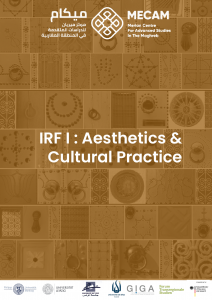
IRF « Aesthetics & Cultural Practices »
Examines how aesthetic forms and cultural practices influence the process by which models and imaginations of the future are expressed and (re-)negotiated. It also investigates the ways in which disparities, political and societal transformations influence aesthetic and cultural practices;
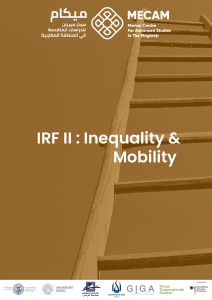
IRF « Inequality & Mobility »
Has a focus on social and economic inequalities, the resulting sense of insecurity, and their role in the (re-)negotiation of visions and models of the future. The IRF specifically explores how distinct forms of disparity (incl. concrete policy decisions) drive or restrain mobility and how in turn, mobility can exacerbate or mitigate inequality;
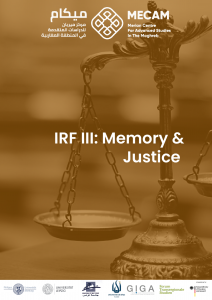
IRF « Memory & Justice »
Discusses legacies of the past, including their legal, political and cultural perceptions and frames in relation to different assessments of the present and to models and (re-)negotiations of the future. Research sheds light on the ways in which differential access to political power shapes questions of accountability, fact-finding, amnesty, judicial reforms, human rights claims and the legitimate sources of law in post-conflict societies and beyond;
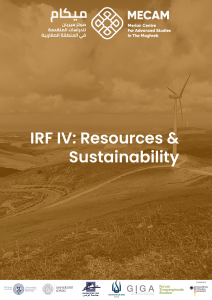
IRF « Resources & Sustainability »
Investigates how societies in general and political decision-makers in particular deal with burgeoning socio-economic disparities and growing environmental problems. This IRF studies which economic models might ensure a politically, socially and ecologically sustainable future. Especially rentier and extractivist economic models in the Maghreb/Middle East are addressed here as these models generate particular forms of disparities and thus also interesting visions of the future.
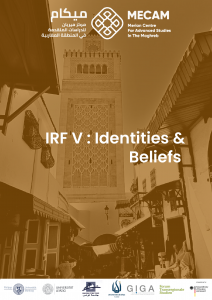
IRF « Identities & Beliefs »
Examines co-existing, sometimes competing identities and belief systems which are partly impacted by political power dynamics. Disparities are felt, perceived and articulated very differently from the vantage point of diverse identities and beliefs, resulting in pluralistic ways of (re-)negotiating imaginations and models of the future. Possible research foci are therefore on topics such as reform-oriented Arab-Muslim thought, the future manifestation of political Islam in the Maghreb but also various of non-religious identities and belief systems.

